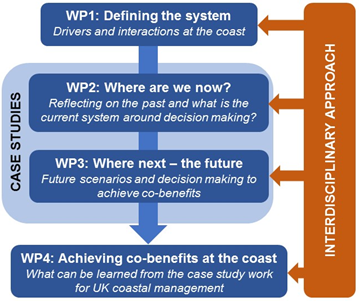Our new framework will combine for the first time: a conceptual representation of the complex coastal socio-ecological system, quantitative valuation of coastal ecosystem services under a changing climate, and the characterisation of how social perceptions and values influence both previous elements. It will be demonstrated for four case studies in the UK in collaboration with national, regional, and local stakeholders.
Transdisciplinary science
Co-Opt brings together approaches from different disciplines that will enable the provision of a holistic conceptual representation of the complex coastal socio-ecological system and consideration of key drivers in this, including quantitative valuation of coastal ecosystem services now and into the future, and the influence of social perceptions and values.

Specific objectives and workplan
We will start by focusing on a generic coastal system. Because of the multiple spatio-temporal scales inherent to coastal systems, we will then step down in scales to focus on our four case studies. We will involve agencies with the statutory duty in each case study area as well as a broader set of stakeholders and experts throughout the project. They will be brought together for workshops at four points through the project to facilitate co-learning across agencies and broader interest groups.
Our specific objectives will be to:
- Define and characterise a generic coastal socio-ecological system.
- Determine the current status of human-environment systems for the four case studies and characterise the extent to which management decisions made to date have accounted for important influencing factors.
- Investigate responses of the human environment systems under future scenarios for the four case studies and consider the role of uncertainties and influencing factors in this.
- Upscale and integrate the learning from the case studies and work with government stakeholders to inform management and policy development.
